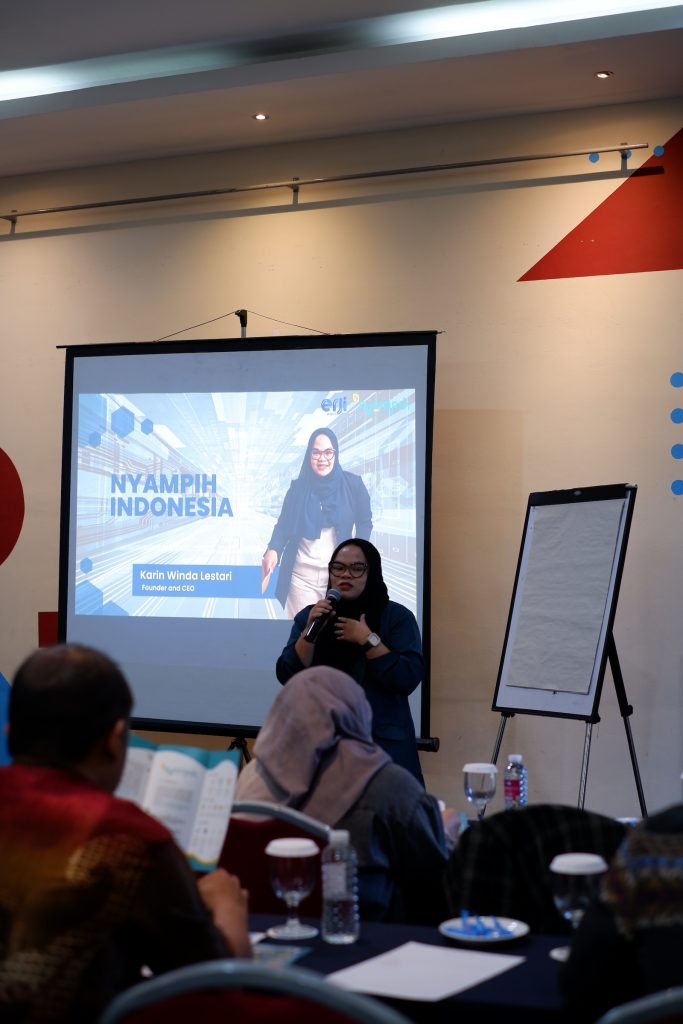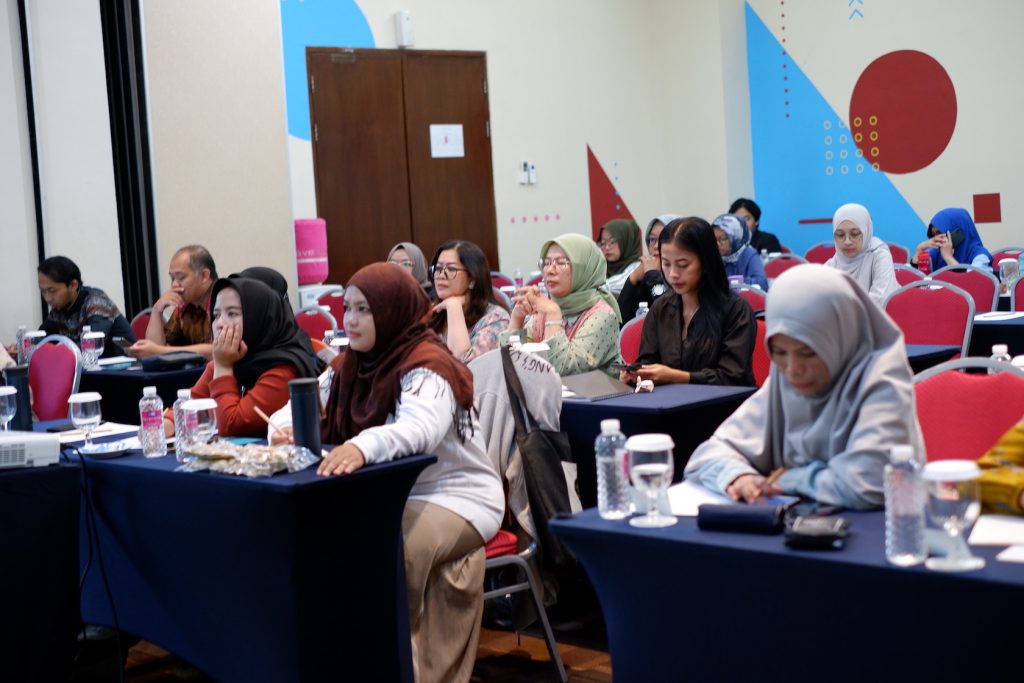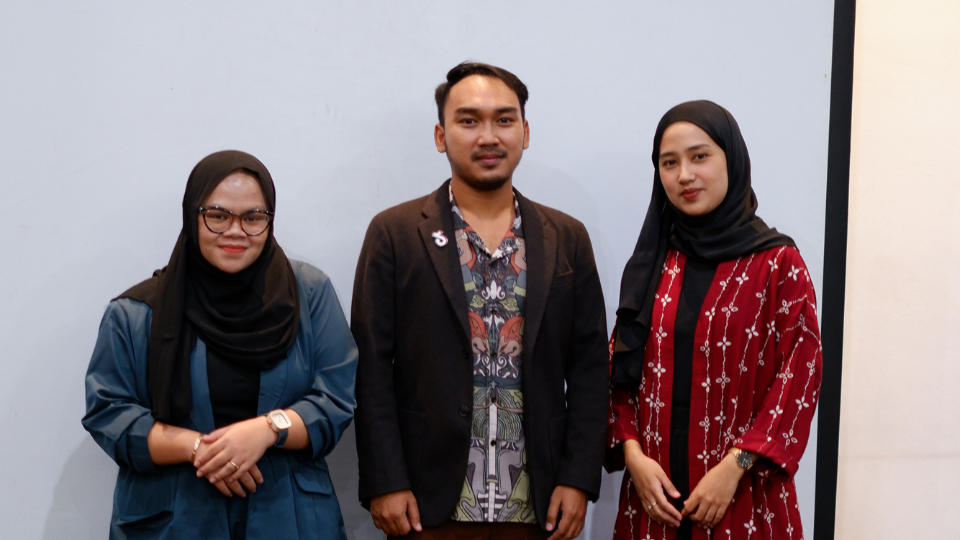Implementing sustainable business practices is increasingly important in this era of digital disruption. Sustainability principles ensure that businesses not only survive but also remain competitive.
To address the challenges of sustainable business amid digital disruption, the SBM ITB collaborated with the Erji Project and Nyampih to host a seminar titled “Sustainable Branding In the Digital Ecosystem: Smartwaste And Empowerment People As Alternative Branding In The Digital Era” at the Fave Hotel Paskal Hyper Square, Bandung (28/12). The seminar aimed to empower various MSMEs in Indonesia. Key speakers included Karin Winda Lestari, Founder and CEO of Nyampih Indonesia; Rio Garia Aprillio, Founder and Director of Erji Project; and Firdilla Qonita, CEO of Sugar Souvenir.
One Location for All Waste Matters

Karin, an SBM ITB MBA alumna, founded Nyampih while still an entrepreneurship student and has won various awards during the business’s existence. Nyampih is a startup founded by Karin and her friends due to their shared concern about the increase in waste in Indonesia, especially in the Bandung area.
Their operations are already running in Gunung Gadung and Gaenas, Sumedang Regency villages, and they hope to expand their positive impact. They aim to address the waste issue in Indonesia through a cellphone application for sustainable waste collection and processing.
“Bandung no longer accepts littering in landfills. Therefore, we must be more concerned,” said Karin.
When someone uses Nyampih, they can schedule a date and time for trash pickup. In collaboration with Nyampih, local youth organizations will collect and store the waste temporarily at the final disposal site (TPA). The waste is then taken to related facilities to be converted into organic compost, materials, packaging, furniture, and many other products that encourage a circular economy. This is Nyampih’s way of building an initiative to sort and dispose of waste properly in the household environment, as well as inspiring local MSMEs to participate in this movement.
“We are open to communicating and collaborating with MSMEs. You just need to sort the waste while we care for the rest.”
Sweet Memories and Environmentally Friendly
Meanwhile, the Sugar Souvenir business started in Bandung Regency, a textile and fabric-producing area. Due to factories’ inability to accommodate all the workers, many people could not find work, increasing local unemployment.
“The values we bring are twofold, namely community empowerment and the environment,” said Dilla. “Apart from providing job opportunities to the community, we are also trying to reduce plastic waste. Why? Because plastic is available everywhere, and the processing process is straightforward from start to finish.”
Sugar Souvenir was founded in 2016 and produces more than 60 eco-souvenirs monthly. The workshop is in Bojongmanggu Village, with over 20,000 finished products sent to more than 2,800 clients in Indonesia, Malaysia, Singapore, Brunei, and even America.
The characteristic of the Sugar Souvenir business is the use of a social approach. They recruit residents and are very inclusive in providing employment opportunities for widows, the elderly, and people with disabilities. They also use environmentally friendly methods to run this craft business, effectively recycling plastic waste into sweet memories.
Another lesson taught by Dilla is the concept of human marketing. In addition to implementing sustainability elements, they also feature the people behind Sugar Souvenir in their content, increasing the authentic feel of the brand and strengthening the feeling of closeness with customers.
“The goal is to create souvenirs that the Earth and people love.”
Everyone Can Create Content
Rio introduced the concept of content creation to MSMEs, emphasizing that everyone can create content.
“Uploading photos on social media, writing texts to promote products to our friends, that’s all content,” said Rio.
Rio explained various techniques that can be used to create content suitable for business. This material covers various aspects, from video production to using camera angles and adding interesting sounds to encourage engagement in the use of effects in video editing. As a creator, Rio also provided examples of material through the content he has created.
Participants could interact directly with Karin, Dilla, and Rio through group discussion forums. They were also invited into a group chat after the event, where they could continue discussions, learn from each other, and build collaborations between businesses.
“Pretty good. My initial goal here was to learn digital marketing. It turns out that I have gained a lot of knowledge today and can bring it back to my business,” said Farrell, a travel agency owner who participated in the workshop.
Bubun, a business owner, also admitted that he learned a lot while attending the workshop. “Branding is a topic that business owners must pay attention to because it relates to how other people see our business, just as they see ourselves,” said Bubun.





